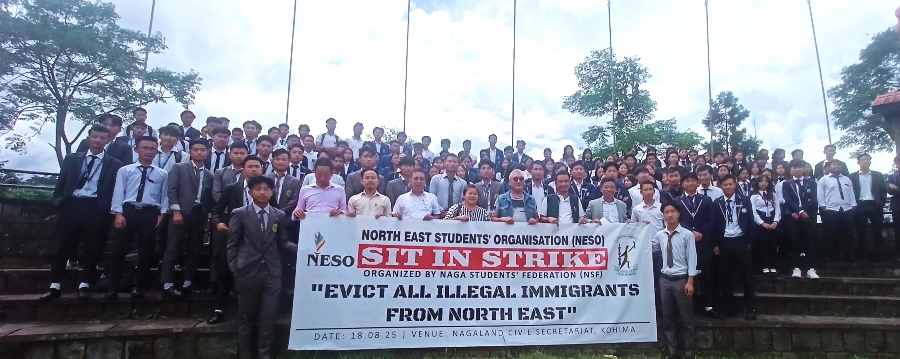The NSF joined NESO’s sit-in strike in Kohima demanding eviction of illegal immigrants from the Northeast, citing demographic and cultural threats.
Share

KOHIMA — The Naga Students’ Federation (NSF) on Monday joined the Northeast Students’ Organisation (NESO) in a sit-in strike demanding eviction of illegal immigrants from the Northeast.
The protest, held at Naga Solidarity Park in Kohima, saw student leaders and participants from various institutions voicing concern over the growing demographic and cultural threats posed by unchecked migration.
Delivering the keynote address, Mutsikhoyo Yhobu, Secretary General of NESO, acknowledged NSF for its consistent support and contribution to strengthening the umbrella body. He said NESO is fully aware of the “immense threat” posed by the influx of illegal immigrants, not only to the present generation but also to the future of the region.
Citing examples, Yhobu said Tripura’s indigenous people have been reduced to a minority in their own homeland, while Assam has endured massive demographic changes. He warned that this trend is slowly spreading to other Northeastern states.
Also read: Naga Students’ Federation seeks ILP cancellation for Assam eviction-hit persons
Yhobu stressed that NESO remains committed to seeking a concrete solution, while also appreciating the Nagaland government’s decision to extend the Inner Line Permit (ILP) system to the entire state. He reminded that NSF has long campaigned for this cause, forming the Inner Line Regulation Committee and submitting research papers to the state government.
Recently, the federation even set up a commission with experts and senior leaders to push for reverting ILP to its original form as a “pass” rather than a permit.
However, Yhobu clarified that ILP and the issue of illegal immigrants are separate. “ILP applies to every outsider who comes to the state. Illegal immigrants, particularly Bangladeshi settlers, are a different challenge altogether,” he said.
WATCH MORE:
Stressing that responsibility lies with both governments and citizens, he urged closer cooperation with tribal bodies and NSF to detect and deport illegal immigrants, alongside strengthening border management, inter-state coordination, and local vigilance.
NESO also appealed to the government of India to permanently seal the Indo-Bangladesh border.
Speaking on the occasion, NSF President Medovi Rhi reiterated the federation’s long-standing fight against illegal immigrants. He urged students to spread awareness on the Bengal Eastern Frontier Regulation (BEFR), 1873, to ensure its successful implementation.
He further appealed to the state government not to issue Inner Line passes to individuals evicted by the Assam government.
Following the sit-in, NESO submitted a memorandum to Chief Minister Neiphiu Rio, highlighting the severe challenges posed by illegal immigration. It stated that migration since Independence has been one of the gravest threats to the socio-cultural fabric, demographic balance, and political stability of the Northeast.
The memorandum cited Tripura as a stark example of indigenous people becoming minorities, while Assam’s anti-foreigners’ movement and the Assam Accord of 1985 remain unresolved due to ongoing migration. Meghalaya too witnessed mass agitations in 1979, 1987, and the 1990s, reflecting fears of displacement. It warned that demographic shifts in Assam are now spilling into Meghalaya’s Garo Hills and neighbouring states.
Despite repeated appeals, NESO said government action has been “inadequate and short-term,” leaving indigenous communities vulnerable. It stressed that the fight against illegal immigration is not merely political but an existential struggle to preserve languages, traditions, and identity.
NESO further highlighted that states without BEFR, 1873 protections are especially vulnerable and must adopt urgent preventive mechanisms.
In its memorandum, NESO placed six demands before the Centre and state governments: immediate detection and deportation of illegal migrants; permanent sealing of the Indo-Bangladesh border; stronger border control using modern surveillance and adequate security personnel; effective inter-state coordination to prevent relocation of migrants within the region; safeguards to protect indigenous rights, culture, land ownership, and political identity; and a Special Review Committee to address population explosions in certain areas.